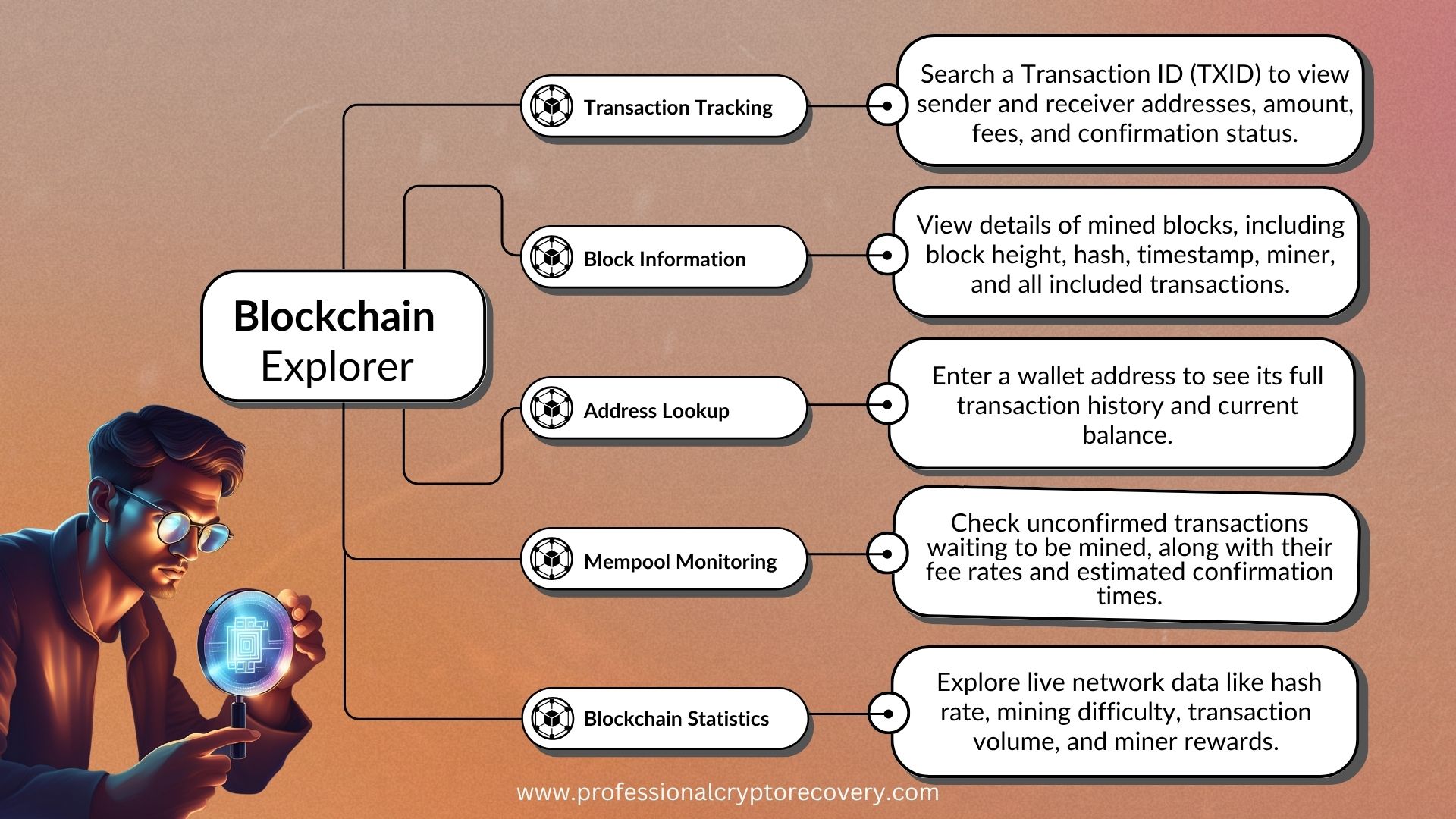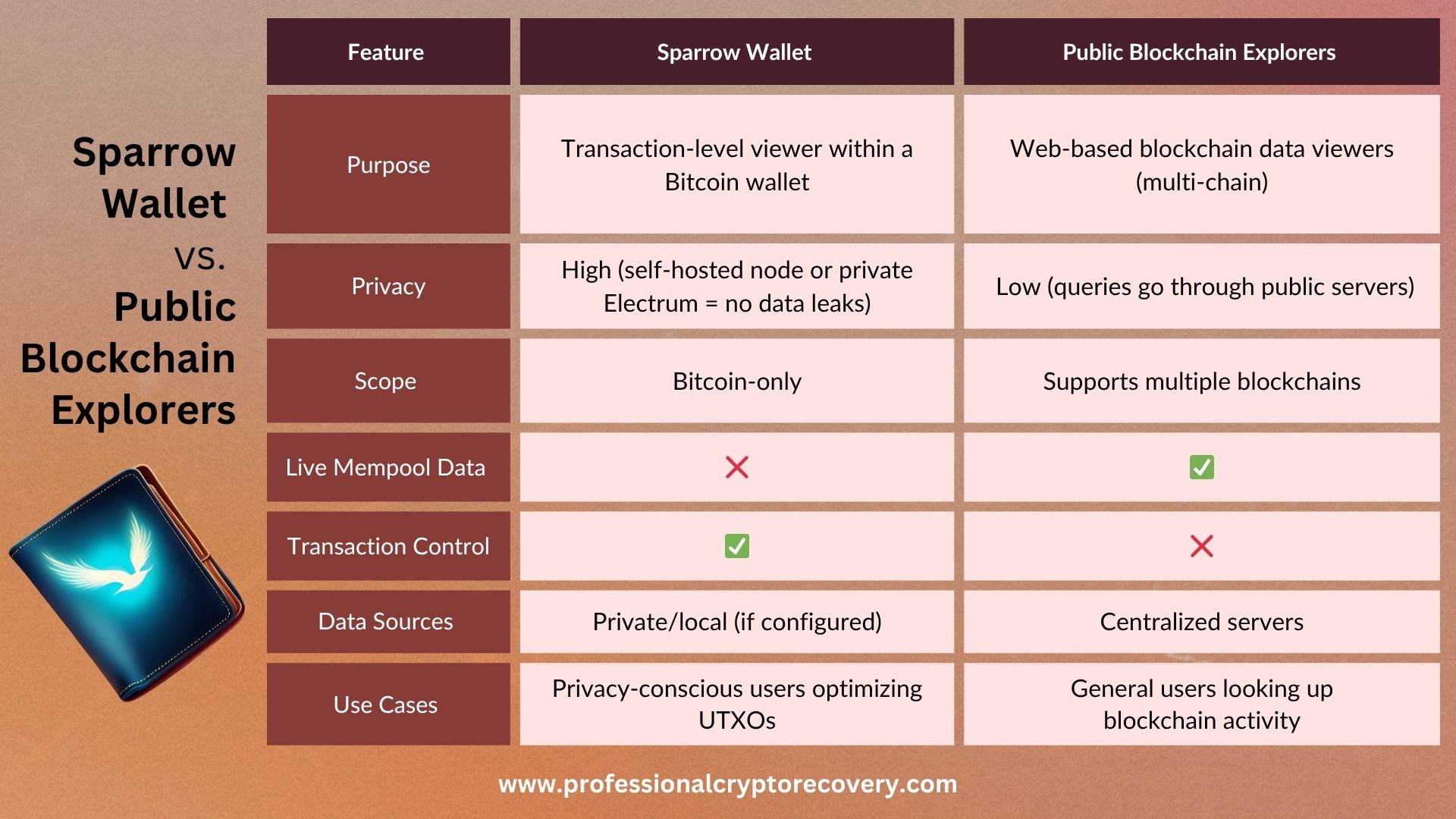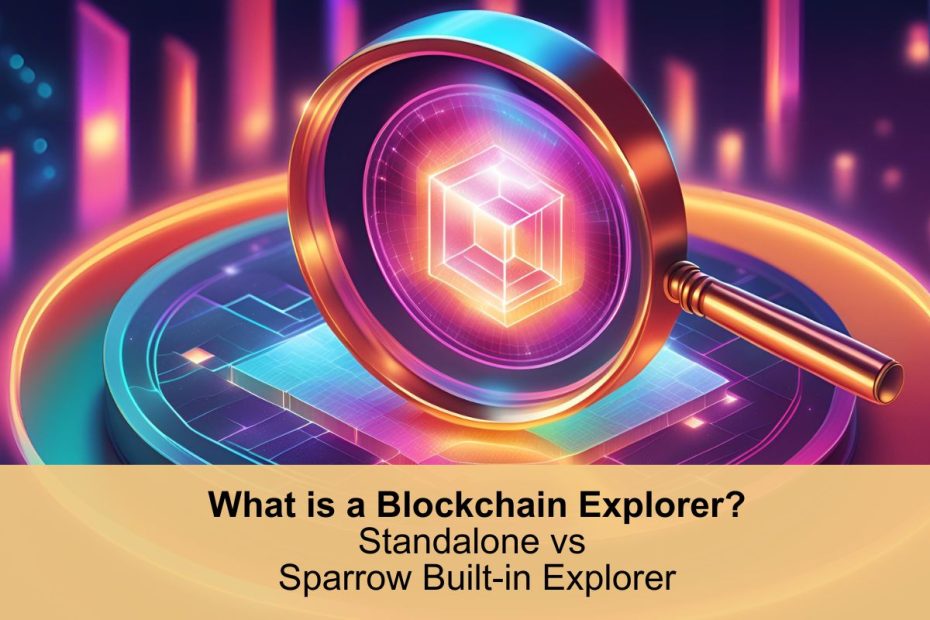Anyone looking for a Bitcoin wallet will find a reliable option in Sparrow Wallet. The wallet is jam-packed with features that enhance your Bitcoin experience and on-chain security. One of these is a blockchain explorer that allows users to trace their tokens’ transaction history back to the initial transaction.
But how does this feature compare to a standalone blockchain explorer? And can it replace the need for one? If you want to find out, keep reading.
What Is a Blockchain Explorer?
A blockchain explorer is a tool that lets users search for, view, and analyze transactions, blocks, addresses, and network activity in real time. Think of it as a search engine like Google or Bing, only for a distributed ledger instead of the web.
Key Features of a Blockchain Explorer
There are many blockchain explorers in the current crypto landscape. Some common features include:
- Transaction Tracking: Allows users to search for a Transaction ID (TXID) to view details such as sender/receiver addresses, amounts, fees, and confirmations.
- Block Information: Displays details about mined blocks, including block height, hash, timestamp, miner, and included transactions.
- Address Lookup: Users can enter a Bitcoin or cryptocurrency address to check its transaction history and current balance.
- Mempool Monitoring: Displays unconfirmed transactions awaiting mining, including their fees and estimated confirmation times. (Has nothing to do with meme coins!)
- Blockchain Statistics: Provides insights on network hash rate, difficulty, transaction volume, miner rewards, and other metrics.

Popular blockchain explorers include:
1. Mempool.space
Mempool.space is a real-time Bitcoin blockchain explorer focused on visualizing the mempool, transaction fees, and mining activity. It lets users track unconfirmed transactions, estimate fees, and view blockchain data.
2. Blockstream Explorer
Developed by Blockstream, this explorer offers detailed transaction, block, and address lookups for Bitcoin and Liquid Network. It also supports testnet, helping developers analyze test transactions.
3. Blockchain.com Explorer
One of the oldest and most widely used blockchain explorers, Blockchain.com’s explorer allows users to search Bitcoin, Ethereum, and Bitcoin Cash transactions. It provides insights on market trends, block confirmations, and historical data.
4. Etherscan (Ethereum)
Etherscan is a blockchain explorer for Ethereum that provides detailed transaction histories, smart contract interactions, and token analytics. It enables users to verify DeFi activity, NFTs, and ERC-20 token transfers.
5. Solscan (Solana)
Solscan is a fast and feature-rich blockchain explorer for Solana, offering insights into transactions, stake accounts, and token activity. It provides a user-friendly alternative to Solana’s native explorer.
6. Block Explorer
Block Explorer is a multi-chain blockchain explorer supporting Bitcoin, Ethereum, Litecoin, and other networks. It provides real-time transaction tracking, block details, address lookups, and mempool data.
Sparrow Wallet’s Explorer vs. Public Explorers
Sparrow Wallet is not your typical blockchain explorer. While the examples above are standalone tools, Sparrow Wallet is just one feature in a larger, relatively lightweight application.
There is no official ‘blockchain explorer feature’ in the wallet.

Transaction Viewer
In Sparrow Wallet, a blockchain explorer is a transaction viewer that also serves as a private blockchain explorer. The viewer is designed to give users full privacy and control throughout a transaction, allowing them to view inputs and outputs, optimize UTXO usage, edit transaction metadata, and reduce fees.
The tool lets users view their full transaction details (TXID, inputs, outputs, fees, scripts) and trace transaction history by following the linked inputs and outputs back to the original transaction. They can also load transactions via TXID, hex, or QR codes. And that is how the transaction viewer can work as a blockchain explorer.
However, it differs from mainstream blockchain explorers in a few ways:
- Privacy: If using Sparrow with a self-hosted node or a private Electrum server, the application does not send queries to external servers, keeping your activity private.
- Bitcoin Only: Sparrow is a Bitcoin-only wallet, so its blockchain explorer only works for BTC transactions. Some blockchain explorers, such as Blockchair and Blockchain.com, support multiple chains.
- No mempool analysis: The typical blockchain explorer includes block-level data and network-wide analytics. Sparrow’s blockchain explorer is tailored for transaction-level analysis, so it doesn’t allow for live mempool tracking.
When to Use Sparrow’s Transaction Viewer Over Public Explorers
Sparrow Wallet’s transaction viewer is ideal for users who prioritize privacy, self-sovereignty, and deep transaction analysis.
Unlike public blockchain explorers, which require querying centralized servers, Sparrow keeps searches private and logs them by third parties by letting users inspect transactions locally when connected to their own Bitcoin node or a private Electrum server.
Sparrow’s transaction viewer is particularly useful for UTXO management and coin control, allowing users to analyze and spend their Bitcoin more efficiently. It is also beneficial for offline transaction verification. Users can load transactions via TXID, raw hex, or QR codes without an internet connection, making it valuable for air-gapped setups.
Developers and advanced users who need to inspect scripts, signatures, and raw transaction data will find Sparrow’s viewer quite powerful.
When to Use Public Blockchain Explorers Over Sparrow’s Transaction Viewer
Public blockchain explorers are better suited for real-time network analysis and broad blockchain insights. Tools like Mempool.space, Blockstream.info, and Blockchain.com provide access to live mempool data, miner activity, and network-wide fee estimates, which Sparrow does not track.
If you need to inspect a transaction without running your own node, public explorers offer an easy way to look up TXIDs, addresses, and block details instantly.
Something else to keep in mind is that for multi-chain tracking, public explorers are essential. Sparrow is limited to Bitcoin. If you have other wallets with assets on other blockchains, platforms like Etherscan, BscScan, and Solscan that support Ethereum, BNB Chain, and Solana are more suitable.
If you need to audit smart contracts, monitor DeFi activity, or check NFT transactions, a public blockchain explorer is the preferred tool.
What is a Blockchain Explorer? And Is Sparrow Wallet’s Version Good Enough?
A blockchain explorer is a tool that lets you track on-chain transactions. Sparrow, on the other hand, is a robust Bitcoin management tool that combines a wallet and a blockchain explorer in one package.
But as a non-custodial wallet, Sparrow makes it your responsibility to resolve any issues that may arise. Unfortunately, some issues can be too much to handle on your own.
That’s where we come in. With extensive experience helping people recover their crypto wallets, we have experience with lost passwords, invalid seed phrases, and damaged backup files. If you experience an issue preventing you from using your Sparrow wallet, contact us today for affordable, efficient recovery services.
Frequently Asked Questions
How does Sparrow Wallet function as a blockchain explorer?
Sparrow’s transaction viewer links inputs and outputs, allowing users to trace transactions back to their coinbase origin. It also enables local transaction inspection via TXID, raw hex, or QR codes.
Does Sparrow Wallet support multiple blockchains?
No, Sparrow Wallet is Bitcoin-only. It does not support Ethereum, Binance Smart Chain, or other blockchains. If you need multi-chain exploration, consider Etherscan, BscScan, or Blockchair.
Can I use Sparrow’s transaction viewer without running my own node?
Yes, but it depends on your setup. You can use public Electrum servers, but this may expose your queries. For full privacy, it’s recommended to connect Sparrow to your own Bitcoin node.
Can Sparrow Wallet replace public explorers entirely?
No. Not entirely. While Sparrow offers private transaction analysis and UTXO control, it does not provide mempool tracking, network-wide fee estimates, or miner insights. Public explorers are still useful for broad blockchain analytics.
